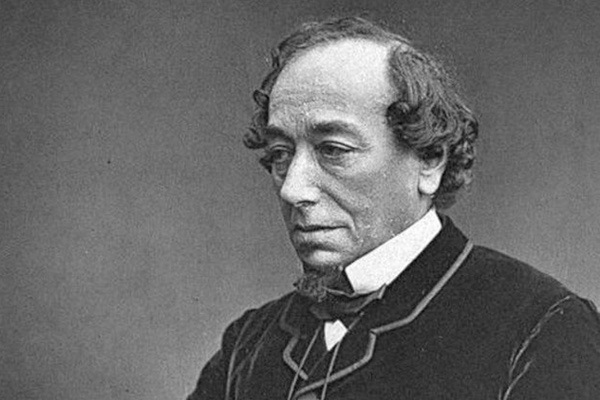Why do we care about politicians' personal lives? Blame Disraeli

Benjamin Disraeli. Wikimedia Commons
We have become used to politicians talking about their emotions and their domestic lives. Indeed, it sometimes seems you can’t get anywhere in politics until you’ve been photographed with your arm wrapped around a photogenic spouse – or, if you are a man, gallantly unloading your own dishwasher.
I’ve been thinking about why our leaders seem so addicted to telling us how they live and what they feel, as well as what they think. And I wonder whether the roots of this obsession might lie in the story of the marriage of Benjamin and Mary Anne Disraeli – a story Disraeli told very well on the stump, to great political effect.
Just like you
The year is 1844; the place is the market town of Shrewsbury. It’s summer time, and the local MP has braved uncomfortable trains and badly-sprung carriages to pay a rare visit to his constituents.
He is an odd figure – pale-skinned and dark-haired, somehow “foreign” – and although the voters of Shrewsbury have elected him, they don’t really trust him. He doesn’t look like a Tory MP, and they remember that during the previous election his enemies papered the streets with broadsides listing his debts.
They like his wife more than they like him, since although she too is an odd creature, overdressed and overly chatty, she brings some glamour and excitement to the town. When Mrs Disraeli campaigns, she distributes kisses, hugs, cakes and purple ribbons among the crowds, showering them with affection, infecting them with enthusiasm for her husband’s cause. So when Mr Disraeli appears without her, the voters complain.
“Wherever I go, I hear of nothing but ‘Mrs Disraeli’ & why she did not come’, he writes in a letter home:
Among the shopkeepers, whom I wish most to please, your name and memory are most lively and influential. ‘Such a gay lady! Sir; you never can have a dull moment, Sir’ & I tell them all that you are a perfect wife as well as a perfect companion; & that separated from you for the first time after five years, we are (alas! alas!) parted on our wedding day! The women shed tears, which indeed I can bearly [sic] myself restrain.
This image of a politician manfully attempting to hold back the tears from his constituents and not quite succeeding, has fascinated me for years. Scenes along the lines of Disraeli’s weepy electioneering in Shrewsbury 170 years ago are all too familiar today: this was the beginning of modern British personality politics.
Big feelings
The Disraelis were married in 1839, five years before he reached for his handkerchief on the hustings. Both were outsiders. She was the daughter of a sailor, made wealthy by her very recently deceased first husband; he was a penniless adventurer desperately in need of a rich wife. Theirs was a tempestuous, extravagant courtship, in which emotions were conjured out of thin air in order to paper over the cracks of an inauthentic, contingent relationship.
Both needed to feel that they were participants in a great romance, so they pretended that they were, swapping ever more competitive declarations of devotion. They got up late, they wrote poems, they rowed and stormed out of rooms. “My nature demands,” he told her at one point, “that my life should be perpetual love.”
So, when Disraeli mounted the hustings in Shrewsbury in 1844, those strategic crocodile tears were perfectly calculated. He wanted the voters to believe he was a happily married ideal husband; the very model of the moral, upstanding Victorian gentleman, the lord and master of a happy home. But he also wanted the voters to think of him not as an outsider, a Jew perhaps not quite “fully English”, but as someone just like them. This is what put him in the political vanguard.
The Great Reform Act of 1832 had given sections of the middle classes the vote for the first time, and Disraeli was in the first generation of politicians who needed to appeal to the middle classes.
In one of his notebooks from about this time, he commented that, for the middle class, marriage was “often the only adventure of life”. His decision to put his own marriage at the heart of an election campaign reflected his sense of middle-class preoccupations.